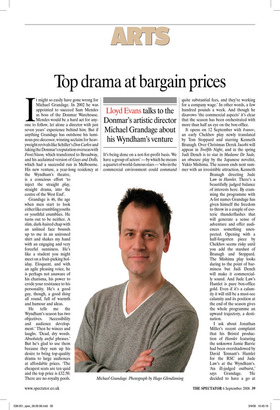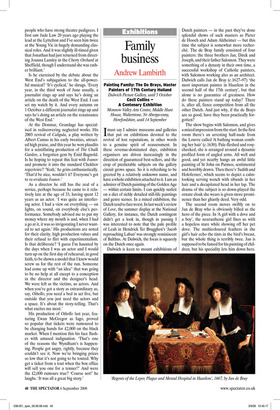Top drama at bargain prices
Lloyd Evans talks to the Donmar’s artistic director Michael Grandage about his Wyndham’s venture
It might so easily have gone wrong for Michael Grandage. In 2002 he was appointed to succeed Sam Mendes as boss of the Donmar Warehouse. Mendes would be a hard act for anyone to follow, let alone a director with just seven years’ experience behind him. But if anything Grandage has outshone his luminous pre-decessor, winning acclaim for heavyweight revivals like Schiller’s Don Carlos and taking the Donmar’s reputation overseas with Frost/Nixon, which transferred to Broadway, and his acclaimed version of Guys and Dolls, which had a successful run in Melbourne. His new venture, a year-long residency at the Wyndham’s theatre, is a conscious effort ‘to inject the straight play, straight drama, into the centre of the West End’.
Grandage is 46, the age when men start to look either like crumbling youths or youthful crumblies. He turns out to be neither. A slim, dark-haired chap with an unlined face bounds up to me in an unironed shirt and shakes my hand with an engaging and very forceful sunniness. He’s like a student you might meet on a fruit-picking holiday. Eloquent, and with an agile pleasing voice, he is perhaps not unaware of his charisma, his power to erode your resistance to his personality. He’s a good guy, though, a good thing all round, full of warmth and humour and ideas.
He tells me the Wyndham’s season has two objectives. ‘Accessibility and audience development.’ Then he winces and laughs. ‘Dead, dry words. Absolutely awful phrases.’ But he’s glad to use them because they sum up his desire to bring top-quality drama to large audiences at affordable prices. ‘The cheapest seats are ten quid and the top price is £32.50. There are no royalty pools. It’s being done on a not-for-profit basis. We have a group of actors’ — by which he means a quartet of world-famous stars — ‘who in the commercial environment could command quite substantial fees, and they’re working for a company wage.’ In other words, a few hundred pounds a week. And though he disavows ‘the commercial aspects’ it’s clear that the season has been orchestrated with more than half an eye on the box-office.
It opens on 12 September with Ivanov, an early Chekhov play newly translated by Tom Stoppard and starring Kenneth Branagh. Over Christmas Derek Jacobi will appear in Twelfth Night, and in the spring Judi Dench is to star in Madame De Sade, an obscure play by the Japanese novelist, Yukio Mishima. The season ends next summer with an irresistible attraction, Kenneth Branagh directing Jude Law in Hamlet. There’s a beautifully judged balance of interests here. By cramming the programme with A-list names Grandage has given himself the freedom to throw in a couple of esoteric thunderflashes that will generate a sense of adventure and offer audiences something unexpected. Opening with a half-forgotten piece by Chekhov seems risky until you add the stardust of Branagh and Stoppard. The Mishima play looks daring to the point of barminess but Judi Dench will make it commercially sound. And Jude Law’s Hamlet is pure box-office gold. Even if it’s a calamity it will still be a must-see calamity and its position at the end of the season gives the whole programme an upward trajectory, a destination.
I ask about Jonathan Miller’s recent complaint that his Bristol production of Hamlet featuring the unknown Jamie Barrie had been overshadowed by David Tennant’s Hamlet for the RSC and Jude Law’s at the Wyndham’s. ‘An ill-judged outburst,’ says Grandage. ‘He decided to have a go at people who have strong theatre pedigrees. I first saw Jude Law 20 years ago playing the lead at the Lyttelton and I’ve seen him twice at the Young Vic in hugely demanding classical roles. And it was slightly ill-timed given that Jonathan had just returned from directing Joanna Lumley in the Cherry Orchard at Sheffield, though I understand she was rather brilliant.’ Is he exercised by the debate about the West End’s subjugation to the all-powerful musical? ‘It’s cyclical,’ he shrugs. ‘Every year, in the third week of June usually, a journalist rings up and says he’s doing an article on the death of the West End. I can set my watch by it. And every autumn on 1 October a different journalist rings up and says he’s doing an article on the renaissance of the West End.’ At the Donmar, Grandage has specialised in rediscovering neglected works. His 2003 revival of Caligula, a play written by Albert Camus in his early twenties, attracted high praise, and this year he won plaudits for a scintillating production of The Chalk Garden, a forgotten gem by Enid Bagnold. Is he hoping to repeat this feat with Ivanov and promote it into the standard Chekhov repertoire? ‘Yeah,’ he grins enthusiastically. ‘That’d be nice, wouldn’t it? Everyone’s got to re-evaluate Ivanov.’ As a director he still has the zeal of a novice, perhaps because he came to it relatively late at the age of 33, having spent 12 years as an actor. ‘I was quite an interfering actor. I had a view on everything — on lights, on sound, on everybody else’s performance. Somebody advised me to put my money where my mouth is and, when I had a go at it, it was so invigorating I never wanted to act again.’ His productions are noted for their clarity, high production values and their refusal to flirt with experimentalism. Is that deliberate? ‘I guess I’m haunted by the days when I was an actor and I would turn up on the first day of rehearsal, in good faith, to be shown a model that I knew would screw us for the rest of the run. Someone had come up with “an idea” that was going to be no help at all except to a conception in the director and the designer’s head. We were left as the victims, us actors. And when you’ve got a story as extraordinary as, say, Othello, you need a bed in act five, but outside that you just need the actors and a space. It’s about the story-telling. That’s what excites me most.’ His production of Othello last year, featuring Ewan McGregor as Iago, proved so popular that tickets were rumoured to be changing hands for £2,000 on the black market. When I mention this his face flashes with amused indignation. ‘That’s one of the reasons the Wyndham’s is happening. People got angry, rightly, because they couldn’t see it. Now we’re bringing prices so low that it’s not going to be touted. Why get a ticket from a tout when the box office will sell you one for a tenner?’ And were the £2,000 rumours true? ‘Course not!’ he laughs. ‘It was all a great big story.’



































































 Previous page
Previous page